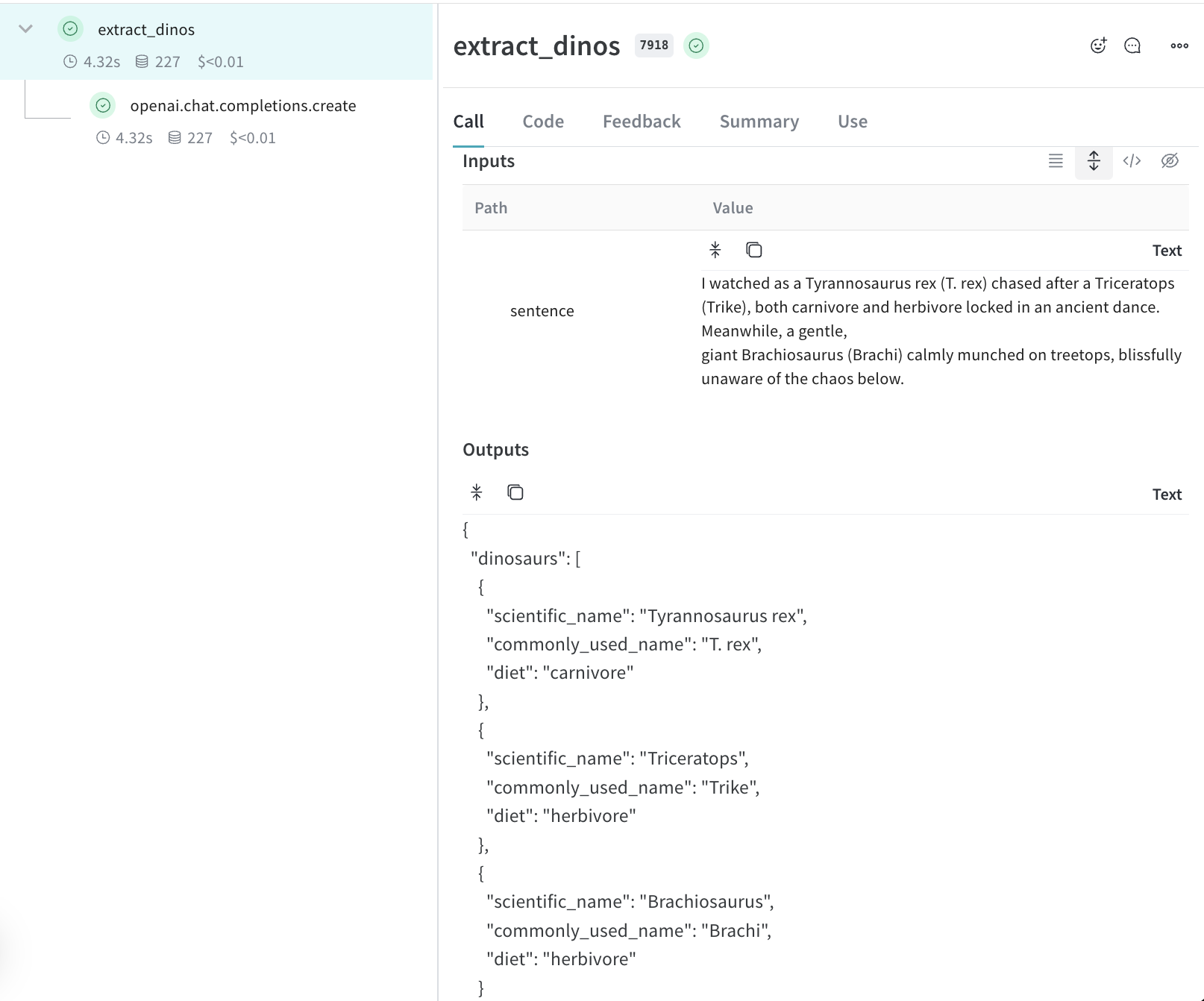Track LLM inputs & outputs
Try our W&B Inference quickstart to get started without external API keys.
W&B Weave makes it easy to track and evaluate your LLM applications. Follow these steps to track your first call or
1. Install W&B Weave and create an API Key
Install weave
First install the weave library:
- Python
- TypeScript
pip install weave
pnpm install weave
Get your API key
Then, create a Weights & Biases (W&B) account at https://wandb.ai and copy your API key from https://wandb.ai/authorize
2. Log a trace to a new project
To get started with tracking your first project with Weave:
- Import the
weavelibrary - Call
weave.init('project-name')to start tracking- You will be prompted to log in with your API key if you are not yet logged in on your machine.
- To log to a specific W&B Team name, replace
project-namewithteam-name/project-name. If you don't specify a W&B team, your default entity is used. To find or update your default entity, refer to User Settings in the W&B Models documentation.
WANDB_API_KEYwith your API key to login without prompting. - Add the
@weave.op()decorator to the python functions you want to track
In this example, we're using openai so you will need to add an OpenAI API key.
- Python
- TypeScript
import weave
from openai import OpenAI
client = OpenAI()
# Weave will track the inputs, outputs and code of this function
@weave.op()
def extract_dinos(sentence: str) -> dict:
response = client.chat.completions.create(
model="gpt-4o",
messages=[
{
"role": "system",
"content": """In JSON format extract a list of `dinosaurs`, with their `name`,
their `common_name`, and whether its `diet` is a herbivore or carnivore"""
},
{
"role": "user",
"content": sentence
}
],
response_format={ "type": "json_object" }
)
return response.choices[0].message.content
# Initialise the weave project
weave.init('jurassic-park')
sentence = """I watched as a Tyrannosaurus rex (T. rex) chased after a Triceratops (Trike), \
both carnivore and herbivore locked in an ancient dance. Meanwhile, a gentle giant \
Brachiosaurus (Brachi) calmly munched on treetops, blissfully unaware of the chaos below."""
result = extract_dinos(sentence)
print(result)
When you call the extract_dinos function Weave will output a link to view your trace.
import OpenAI from 'openai';
import * as weave from 'weave';
const openai = new OpenAI();
async function extractDinos(input: string) {
const response = await openai.chat.completions.create({
model: 'gpt-4o',
messages: [
{
role: 'user',
content: `In JSON format extract a list of 'dinosaurs', with their 'name', their 'common_name', and whether its 'diet' is a herbivore or carnivore: ${input}`,
},
],
});
return response.choices[0].message.content;
}
const extractDinosOp = weave.op(extractDinos);
async function main() {
await weave.init('examples');
const result = await extractDinosOp(
'I watched as a Tyrannosaurus rex (T. rex) chased after a Triceratops (Trike), both carnivore and herbivore locked in an ancient dance. Meanwhile, a gentle giant Brachiosaurus (Brachi) calmly munched on treetops, blissfully unaware of the chaos below.'
);
console.log(result);
}
main();
When you call the extractDinos function Weave will output a link to view your trace.
3. Automated LLM library logging
Calls made to OpenAI, Anthropic and many more LLM libraries are automatically tracked with Weave, with LLM metadata, token usage and cost being logged automatically. If your LLM library isn't currently one of our integrations you can track calls to other LLMs libraries or frameworks easily by wrapping them with @weave.op().
4. See traces of your application in your project
🎉 Congrats! Now, every time you call this function, Weave will automatically capture the input & output data and log any changes made to the code.

Next steps
Now that you've seen Weave in action, try the W&B Inference service for easier experimentation. Get Started with W&B Inference - no need to manage multiple API keys, and free credits are included.
Continue learning:
- Track flows and app metadata - Dive deeper into tracing complex applications
- Build evaluations - Learn systematic model evaluation
- Explore integrations - Connect more LLM providers and frameworks